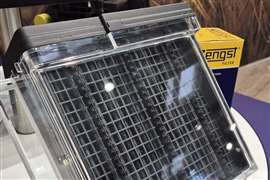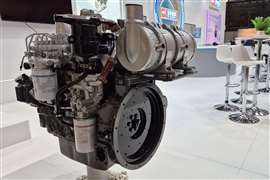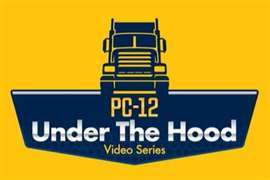Rolls-Royce engines target IMO compliance, sustainable fuels
07 September 2022
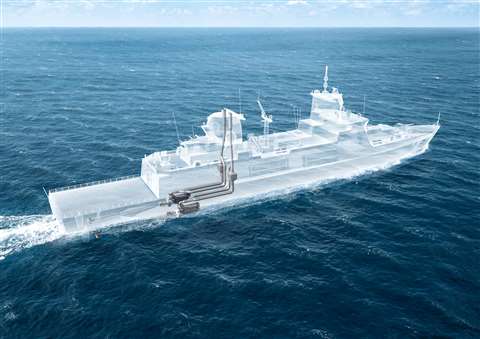 Rolls-Royce plans to further develop its mtu 1163 and 8000 series large marine engines to comply with IMO Tier III. (Photo: Rolls-Royce)
Rolls-Royce plans to further develop its mtu 1163 and 8000 series large marine engines to comply with IMO Tier III. (Photo: Rolls-Royce)
Not only did it highlight developments in its large marine engines to comply with the International Maritime Organization (IMO) Tier III emissions directive, Rolls-Royce also announced the scheduled approval of sustainable fuels in select marine diesel engines during the SMM Hamburg international trade fair for the maritime industry.
Rolls-Royce said it will further develop its mtu 1163 and 8000 series large marine engines to comply with IMO Tier III, which will allow vessels powered by the engines to enter Emission Controlled Areas (ECA) such as the Baltic and North Seas and off the North American coast. The company is also aiming to become an IMO emissions certificate holder, which it said would significantly reduce the workload for shipyard customers.
Beginning in 2025, the engines will be available in 16V- and 20V-cylinder IMO Tier III-compliant variants in power ranges from 4800 to 10000 kW. The necessary exhaust gas aftertreatment with SCR system is being developed by the company in-house to ensure the system is precisely adapted to mtu engines and customer requirements. The SCR system can be installed horizontally or vertically to adapt to a variety of ship designs and layouts, plus can be ordered shockproof, if needed, for military applications.
“With the decision to further develop our mtu Series 1163 and 8000 engines for the strict IMO Tier III emission requirements, we are giving our customers planning security,” said Klaus Schmidt, director, Naval Application Engineering at Rolls-Royce Power Systems business unit. “At the same time, we are making our mtu large engines – which have set standards in their power range for many years in terms of power density, efficiency and economy – future-proof and more climate-friendly.”
Approved for sustainable fuels
Another milestone on the road to climate-neutral shipping is Rolls-Royce’s plans to approve the use of sustainable fuels in its Series 2000 and Series 4000 mtu marine diesel engines.
Following the conclusion of successful bench and field tests, the Power Systems business unit will gradually approve the engines for EN15940 synthetic diesel fuels beginning in 2023. Approved fuels will include the BtL (Biomass to Liquid), HVO (Hydrotreated Vegetable Oil/renewable diesel) and PtL (Power to Liquid) such as e-diesel. The fuels will all be able to be used in place of conventional diesel fuel without any adjustments in these engines.
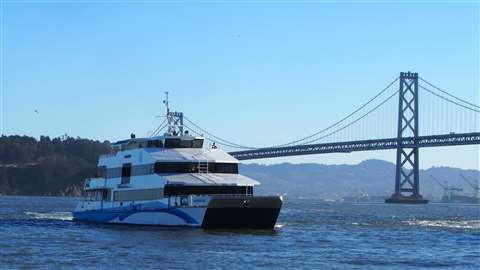 Since 2019, California ferry operator Golden Gate Ferry has been successfully testing the use of sustainable HVO with mtu engines in six ferries in its fleet. Shown is the ferry Mendocino of GGF in front of the Golden Gate Bridge. (Photo: Rolls-Royce)
Since 2019, California ferry operator Golden Gate Ferry has been successfully testing the use of sustainable HVO with mtu engines in six ferries in its fleet. Shown is the ferry Mendocino of GGF in front of the Golden Gate Bridge. (Photo: Rolls-Royce)
“There is already a lot of interest now from many customers in the marine industry who want to improve their carbon footprint, particularly with HVO,” said Denise Kurtulus, vice president, Global Marine, Rolls-Royce Power Systems. “Results from pilot customers show significant reductions in greenhouse gases, nitrogen oxide and particulate emissions by using HVO instead of fossil diesel.”
For example, Golden Gate Ferry in San Francisco, Calif. (USA), has been successfully testing the use of HVO with mtu engines in six ferries in its fleet. In more than 41,000 operating hours, tests confirmed that when HVO is used, mtu engines perform the same as diesel in terms of maximum power, load acceptance and fuel consumption. Four other shipping companies in the U.S. are also testing the use of HVO with their mtu engines.
HVO is a drop-in fuel, which means that the previous diesel system infrastructure can remain unchanged for its use, and no engine hardware or software modifications are required. Its benefits include clean combustion with reductions in particulate emissions of up to 80%, nitrogen oxide emissions by an average of 8%, and (depending on manufacturing process and feedstock) CO2 emissions by up to 90% compared to fossil diesel.
Following the Series 2000 and Series 4000 mtu engines, Rolls-Royce plans to approve its mtu 1163 and 8000 series models for use with sustainable fuels in the course of 2025.
“We have realigned our offering for the maritime industry to actively support ship operators on their journey to Net Zero,” explained Kurtulus. The company is now working on methanol engines and fuel cell systems for shipping and developing electrolyzers to produce green hydrogen.
POWER SOURCING GUIDE
The trusted reference and buyer’s guide for 83 years
The original “desktop search engine,” guiding nearly 10,000 users in more than 90 countries it is the primary reference for specifications and details on all the components that go into engine systems.
Visit Now
STAY CONNECTED




Receive the information you need when you need it through our world-leading magazines, newsletters and daily briefings.
CONNECT WITH THE TEAM











